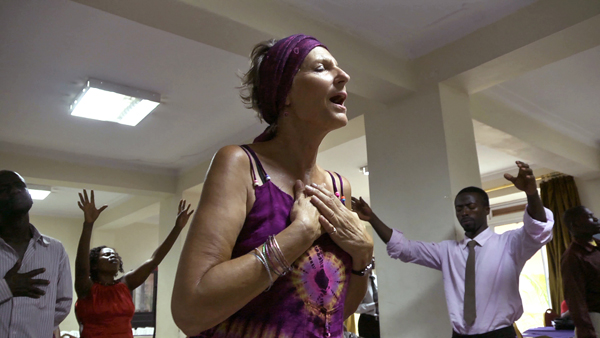For viewers who know about the Christian Right’s proselytizing in Africa, this film may be too basic. But for those who are unaware, it’s a real eye-opener. The idea that American missionaries are naive, harmless, misguided or any other innocuous adjective will be put to permanent rest after seeing this chilling documentary by Roger Ross Williams (director of the Oscar-winning short “Music by Prudence”). His film convincingly reveals how American megachurches are directly responsible for the vitriolic attacks on LGBTI people (as individuals and as a class) in Uganda, funding preachers (a pastor of one of the affiliated churches is now one of the nation’s richest men) and young people to carry out their toxic message.
The International House of Prayer (IHOP) was founded in 1999 in Kansas City, Missouri, and currently has 1,000 full-time staff members. They market globally, with a broadcasting system available in 160 nations. What are they marketing and exporting? Homophobia, believing gays are responsible for Nazi Germany, gay sex is against natural and spiritual law, homosexuals recruit children, etc.
IHOP believes Uganda is the “Pearl of Africa” that will enable them to reach young people throughout the world—50 percent of Ugandans are under the age of 15. And horrifyingly, it looks like they are succeeding. It’s estimated by one critical minister that 95 percent of the Ugandan population actively shares a hatred of “homos”—visibly apparent when a tabloid publishes front-page photos of people who are perceived to be gay or support gay rights with the headline “Hang Them” and as the parliament tries to pass a law of life imprisonment for gays and the death penalty for “repeat offenders.”
Using vérité footage and interviews, the film focuses on American evangelists, such as IHOP senior leader Lou Engle, Rev. Jo Anna Watson, as well as the young missionaries that make up the “front lines in a battle for billions of souls,” who say and do things in Uganda that couldn’t be done in America to such a wide audience. In a bizarre, almost-too-surreal-to-be-believed scene, an African preacher, trained by IHOP, preaches during against the perversion of “homos” with the use of blown-up hardcore pornographic photos of white men in leather.
American trained evangelists also preach abstinence and for the ban of condoms, two positions the Ugandan government, not so coincidentally, supports. In a country with staggering HIV rates, it’s hard to see these actions as simply the misinformation of a fringe element. God Loves Uganda takes the evangelists portrayed in the 2006 documentary Jesus Camp to an entirely different and horrifying level, for Jesus Camp focuses on the U.S., with its overriding laws and culture offering a check and balance and allowing viewers to imagine the film’s subjects as a small subset of the population. God Loves Uganda shatters this illusion.
Most of the exploration about race, class, and colonialism is implicit rather than explicit except in a few instances. Christopher Senyonjo was a Ugandan bishop for 24 years. When members came to him concerned about their sexuality after they were rejected and abused for being gay, Bishop Senyonjo said “Accept yourself for who you are.” The Church of Uganda (part of the Anglican Communion) excommunicated him. Courageously, he has stood by the LGBTI people, paying a very high price personally and professionally. He says, of the general Ugandan population’s relationship to the American evangelists, “Because they are white, people believe them.”
An excellent and indeed necessary companion to God Loves Uganda is the documentary Call Me Kuchu. Winner of multiple awards, it features David Kato, the first openly gay man in the country who was murdered on January 26, 2011—and he also appears in God Loves Uganda. Call Me Kuchu offers a more personal, visceral, and direct experience of the LGBTI people in Uganda as a result of American evangelism.

















Leave A Comment